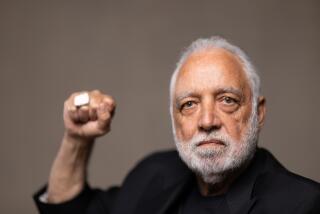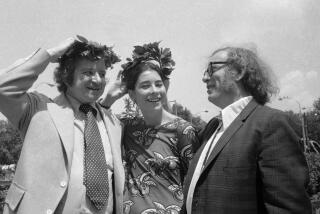The Rev. Jerry Falwell should be taken...
- Share via
The Rev. Jerry Falwell should be taken at his word that he wants to reduce his stressful involvement in politics, says a noted sociologist of religion. But Falwell’s resignation this week as founding president of the 8-year-old Moral Majority also comes at a time when the lobbying group has lost much of its prominence.
Falwell, who will do some interviews in Los Angeles next Friday to promote his newly published autobiography (“Strength for the Journey”), has impressed journalists with his willingness to squeeze in many interviews and news conferences on a crowded day and otherwise fill up a hectic schedule.
But when Falwell on Tuesday announced his resignation as president of Moral Majority and Liberty Federation, he said he was tired of being the “lightning rod” for opponents of the Religious Right and wanted to concentrate on his church, television and educational ministries in Lynchburg, Va.
Sociologist Jeffrey Hadden, a University of Virginia professor who has followed the major television evangelists’ careers, said Falwell is “trying to get back to some normal pattern in his life. He had been persuaded by his colleagues and his own experience that he was spread too thin.”
At the same time, Hadden and three other sociologists found last year in an analysis of Moral Majority’s activities in the early 1980s that there was little grass-roots activity by local chapters, some of which existed mostly on paper.
Likewise, the Lynchburg News & Daily Advance reported in September that financial records of the Moral Majority showed that it played a significant funding role in only two candidates’ political campaigns since the organization’s founding in 1979. One was the 1984 reelection of Sen. Jesse Helms (R-N.C.) and the other was the unsuccessful 1983 state senator race of a former Falwell aide in Virginia.
The Moral Majority drew its impact from the media savvy and provocative personality of Falwell himself, critics and supporters said.
But Moral Majority was given less public visibility by Falwell in January, 1986, when he subsumed it into an ostensibly broader lobbying group, the Liberty Federation.
“The Moral Majority isn’t what it used to be (in national impact),” said Arthur Kropp, acting president of People For the American Way, after Falwell’s Tuesday announcement. “But there has been a proliferation of these organizations, particularly in education, and they now have a presidential candidate (Pat Robertson). This doesn’t close the book on the Religious Right,” Kropp said.
CONVENTIONS
The Southern Baptist General Convention of California will consider, for the second year in a row, changing its name to California Baptist Convention during its annual meeting Tuesday and Wednesday at the Oxnard Civic Auditorium. The proposed change--designed to remove the regional sound to the name of the largest Protestant body in California--was defeated by a slim margin last November.
DATES
The Rev. William Schultz, president of the Boston-based Unitarian Universalist Assn., will talk on the responses of the liberal religious denomination to current issues at 8:30 p.m. today at the Unitarian Community Church of Santa Monica. He will also speak during the 11 a.m. service there Sunday.
A coalition of ministers, religious scholars and attorneys who met for a religious liberty consultation in Los Angeles last week have announced a “Congress on Religious Liberty” to be held Jan. 14-15 at Fuller Theological Seminary. The group’s immediate concern is to seek legislation in the California Legislature that would “nullify clergy deference to psychiatry in dealing with the suicide-prone.” The coalition has worried about the implications of a recent state Court of Appeal ruling that said pastors counseling “suicidal individuals” could be sued for not referring them to mental-health professionals.
PEOPLE
Los Angeles attorney Allan B. Goldman, a member of Leo Baeck Temple, was elected chairman of the board of trustees of Reform Judaism’s Union of American Hebrew Congregations this week in Chicago. At 52, Goldman is the youngest board chairman in the history of the 1.3-million-member organization. Delegates to the national biennial convention elected him to a two-year term, which is traditionally extended by a second term.
More to Read
Get the L.A. Times Politics newsletter
Deeply reported insights into legislation, politics and policy from Sacramento, Washington and beyond. In your inbox twice per week.
You may occasionally receive promotional content from the Los Angeles Times.










